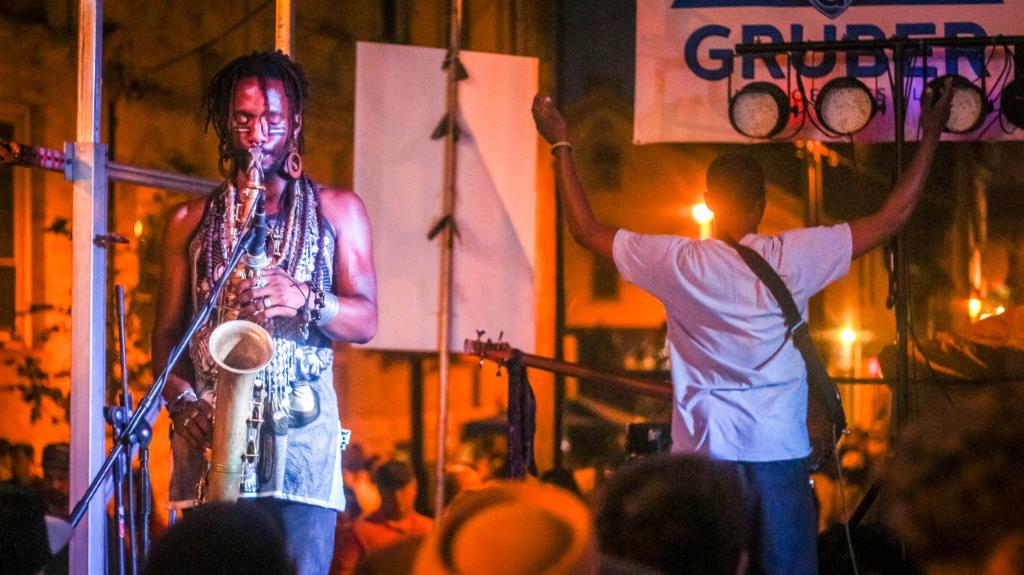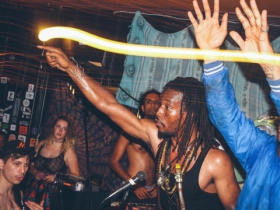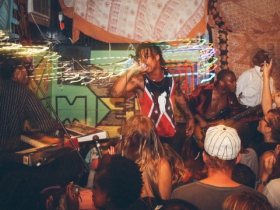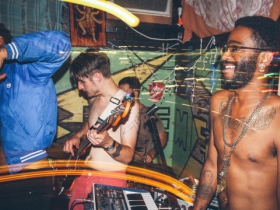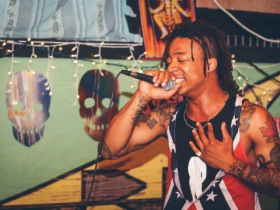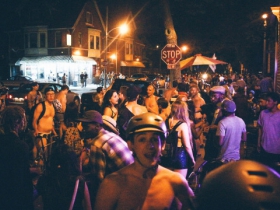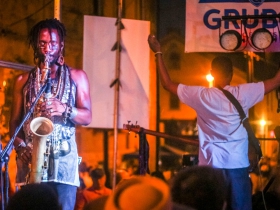The Musical Journey of Jay Anderson
The leader of Foreign Goods, just 23, is a deep thinker and musician.
To call James Julius Anderson (better known as “Jay”) a prolific saxophone player would be a definite understatement. In the month of June alone he performed at 35 gigs, including three sets at Summerfest. He’s played alongside jazz ensembles, Latin, Afrobeat, psychedelic rock, surf pop, folk punk, and hip-hop bands, to name a few. The first time I sat down with the 23-year-old was after Locust Street Festival. Since that night I’ve been to his Riverwest home a number of times to sit in on practices and private house shows. It’s a warm, sunny place full of plant life, good food, books, art, music, instruments, tapestries, sculptures, and artifacts from all over the world. It’s also become a gathering place for the vibrant Milwaukee music scene, including the launch pad for his latest project, Foreign Goods, a supergroup made up of Milwaukee musicians from New Age Narcissism, Soul Low, The Remedy, and Klassik.
Foreign Goods, which plays Saturday at the Urban Island Beach Party, had their public premiere at Bremen Cafe on July 9. Cult rapper Lorde Fredd33 opened the show. Fredd33 wore a ripped confederate flag tank top that was eventually burned and stomped on. It was a shoulder-to-shoulder, sweat-fest, chant-a-long type of evening. Foreign Goods kept the energy up in fantastic fashion, including a rowdy cover of “Fried Neckbones and Home Fries” by Willie Bobo. This Saturday Foreign Goods will play the Urban Island Beach Party at Lakeshore State Park at 12:30 p.m. and later that night at Transfer Pizzeria. The following are excerpts from my two conversations with Anderson.
How did you start playing music?
My grandpa was a farmer and a saxophone player in Gary, Indiana. It totally skipped my dad, he didn’t play any instruments but he loved jazz. One of the few things I remember from an early age was my dad singing and scatting around the house. My parents lived on 35th and Silver Spring, so I wasn’t allowed out of the house there. It was very straight edge.
But I also grew up with my grandma on the East Side. My grandma was a drinker and a smoker and a bowler. She was a regular at Landmark Lanes. Her jersey and her photograph are up in the back. She would bowl for money and clean up, she was so good. So we hung out and saw all types of crazy shit.
Some cop came to my elementary school who could play a bunch of instruments. He had them set up onstage, he drew the curtains, he went down the line and played all of them. When he played the sax I said, “That’s mine right there.” I was in 4th grade and I started playing sax the next year. I had a few lessons in band class and throughout my life I’ve only had about 20 lessons.
I went to Dominican High School for a year then Riverside, which was probably the best thing that ever happened to me. Mike Van Pelt is the band teacher at Riverside and he’s a total hard ass. And it seems like every six months or so some badass of some degree comes along to push me and get my shit together.
Who are your major musical influences?
Ravi Shankar is probably my single biggest influence. A lot of people can’t hear it in my playing but it’s more conceptual. It’s about how you zone out when you’re zoning in. The next one would be John Coltrane, who was actually good friends with Shankar. Coltrane named his son after Ravi. The way you conceptualize South Indian classical music is super similar to what Coltrane and those guys were doing with modal music in the 50s and 60s on records like Bitches Brew and Kind of Blue. There’s also Fela Kuti, Willie Bobo, Héctor Lavoe, a lot of South Indian and Middle Eastern musicians. There’s this cat Ali Akbar Khan, he’s like the master of the Indian sarod. The way they play it, it sounds so close to the human voice. They have notes that are in between our notes, and they hear them deeply.
As an artist though, like the total package, Amy Winehouse is my number one. She was it and she died so early. She’s all real, all the time, none of it’s an act. Go buy her live DVDs and watch them enough that you memorize what she does onstage. She has shows where she gets too drunk and rants and cracks jokes so she doesn’t cry about the next song she’s about to play. If you read about her life and learn about what she went through, you realize who she’s talking about in her songs, that they’re true stories.
Maybe that’s why the Milwaukee music scene is getting better, because more people are less afraid to talk about their lives. When you’re honest other humans can’t help but respond. I learned that from Amy. She gave me the confidence to dance onstage and make eye contact with the audience. And that put me in the position to get the gigs I’ve gotten.
When did you start playing music professionally?
I went immediately from high school and college level playing to hiring my teachers for gigs. And I’ve played with them for a long time and it’s been great. That’s The Remedy (another band Anderson works with). That’s the band. If Obama hit me up and said “I need a house band for my party tomorrow night,” I’m calling The Remedy. Steve Peplin is an encyclopedia of guitar. Ethen Bender can play all the craziest and funkiest shit possible on a bass. Tim Russell’s the machine. He hears and knows everything at all times, he’s like omnipotent on the drum set. And Dave Wake is just the guy, he does De La Buena and other stuff like The Urbanites and Aluar Pearls. He’s my musical big brother. He opened my ears to be like, “No man, music is whatever you make it. It’s not something that someone else taught you.”
So I love that band. All those guys are teachers. Peplin is a jazz guitar professor at Lawrence University and MATC, Tim is the music director for UWM’s dance program, Dave teaches Latin Jazz at the Wisconsin Conservatory of Music, and Bender teaches the jazz program at the Milwaukee Youth Symphony Orchestra. I play with them a lot, but being realistic, I can’t catch the kind of gigs yet that’s worth any of their time to tour.
Why haven’t you moved to a bigger market like New York City?
I have too many friends who’ve gone to Boston, New York, LA, good people and good musicians, they’ve toured the world with some killers, but they move back to Milwaukee. They go out there and spend all their money, get stressed out and broken down, then they have to move back in with their parents to save money to rent a place in Riverwest. All the while I’ve been here practicing, booking gigs and making connections. When my twenty-year-old friends who go to NYU for jazz come back to Milwaukee I’ll book us a gig on two weeks notice where everybody gets a hundred dollars, we play two or three sets, the food and drink is comped, and they’re amazed at how sweet it is.
This is not the old days. In the 20s, 30s, and 40s records were not that prevalent and they were expensive, so unless you went to New York you might not ever hear Satchmo (Louis Armstrong). Hearing him live is the kind of experience that can elevate your understanding of music to the point where you might be inspired to become an artist. But I got Satchmo’s discography on my iTunes. I know it’s not the same thing as experiencing it in a club, but to me that’s a matter of concentration. Are you sitting down and closing your eyes and actually listening to it? Or do you have it on in the background while you’re cleaning your house?
I also have a strong belief in bringing people here. Go out and learn, then bring it back. At some point I’ll buy property and travel. But right now I want to help raise the level of musicianship in Milwaukee. Let someone fly me out to New York after I’ve established myself here at home, but I’m not trying to go there and struggle. I’m not interested in leaving the house until my bed’s made.
How has your understanding of music evolved since you started playing?
My thing now is, how do I make people dance? How do I engage the audience? I understand there is cerebral music, there’s a bebop tradition and there’s an orchestral music tradition. There are places and times for those people. That’s when you put on a tuxedo and you go see the symphony orchestra and you shut your mouth and listen. Or it’s when you pay good money to see a weekend show at a jazz club. The musicianship is on another level, that’s why it costs so much. Because they know something about their instrument that you may not know in this lifetime and they’re demonstrating it for you. At some point in my life I’d like to get to that level. But an excellent artist takes themselves, their band mates, the club owner, the audience, and the rest of the city into account as opposed to just the instrument.
There are so many jazz musicians who dress like they just got out of jury duty, they sit in a chair, they play their instrument and hardly say anything. Fuck that. My question is can you play a gig and pay attention to the audience? Don’t get all high and mighty with me about what you think is going on, if a deaf alien landed on Earth and came to your gig, all they need to see is there are some hairless apes onstage doing something with things that are making other hairless apes move their bodies.
How did you get connected with New Age Narcissism?
The first interaction I ever had with NAN was Lorde Fredd33 made a public post on my Facebook Wall that said something like, “Eye need a saxophone solo that sounds like climax.” I figured out he was at Kiran Vee’s house so I went over and recorded and it was dope. It was that “6AM” track. Later he had me record on the first track off 33: The Education [https://newagenarcissism.bandcamp.com/album/33-the-education-2]. After the Quincy Jones tribute show Kiran called me and asked if I’d play at WebsterX’s Summerfest show. Then I started learning the material and they were like, “Well, you might as well play at Lex Allen’s Summerfest show too.” Then I had all the material memorized and knew all the lyrics and started wigging out onstage and they were like, “You might as well just come to all the gigs.” The energy is incredible too, it harkens back to Gregorian chants and tribal music.
At this point the NAN movement is so strong, I’ll cancel a high-paying gig to be in the audience at one of their shows. Because it’s important that your face is there and you’re a part of the tribe, the community and the movement. Facebook is a great tool, the Internet is a great tool, but you have to get out. Every night I’m not gigging I try to go to a show. It keeps you relevant. Why should someone go to your show if you don’t go to theirs? If you have a family, those people are excluded. They have priorities. But if you don’t and you’re a musician who takes your artistry seriously, you need to be a part of the scene.
The other thing is that because I’ve played with bands like The Remedy and Aluar Pearls I haven’t had the opportunity to play with people my age. I haven’t been in the kind of band where we’re hanging out at night. I’ve never gone out to a bar as a single guy with a fellow musician. So NAN has been great because me and Chris Gilbert will go out and be wingmen. And that’s what I like about Foreign Goods too. It’s a chance to play music and hang out with guys my age.
How did Foreign Goods form?
Foreign Goods was birthed out of my desire to make quality music with people my age that has an actual social impact, not just to pack a club. When I make music with a band who’ve been owning this for as long as I’ve been alive, that’s easy. But getting a band together of musicians my age doing the same level of work, that’s a totally different thing. I can take more liberties with those older guys because they are masters. But with Foreign Goods we all need to come with 150 percent. I want to squeeze every drop of artistry from every person in this band, like I’m wringing out a towel. I want to push them to the very edge of what they’re willing to give me, because it will make us better.
I have a big ear. So I listen to whatever dance music people play. I’ve learned lots of different styles like Indian music, Afrobeat, Latin music and funk. Funk is kind of crazy, and I know people are going to hate me for saying this, but funk kind of encompasses jazz, bebop, R&B, and rap, so it’s the easiest delivery method for all those styles. Foreign Goods is dope because we have everyone’s input, everyone’s various musical backgrounds. And I’m by no means the leader.
But it feels like you’re the leader.
The way the stars form, there are these clouds of interstellar dust, very basic molecules and elements, some of them are 14 billion light years across, but because it’s in deep space where nothing else happens, all the molecules in the cloud are equally spaced apart. This is where the music analogy comes in. Kiran’s been killing it for a long ass time, so has Sam Gehrke, so has Tim Russell, so has Klassik, and I’ve killing it for a long time, too.
We’re all in totally different places with the perfect amount of space apart. When stars form something happens, a supernova could explode somewhere, a shockwave could go through the solar system, and because of the basic laws of physics, when two molecules get closer together in a vacuum it makes more gravity, so all these molecules get closer together and the temperature rises until they ignite and make a star. That’s how life starts. So by no means am I the leader of the group because if anyone left the group, it wouldn’t be Foreign Goods.
[Minutes before my second interview with Jay I ran into Dave Wake at Fuel Cafe and asked him about the Foreign Goods private unveiling at Jay’s house in June.]
DAVE: It was pretty amazing to see that kind of community going on. It’s a great group of musicians. Jay is like a little brother to me. I started out teaching him at the conservatory. One thing about him is that he has no fear. He just goes for it, which is refreshing. Some people over think stuff. He’s pushing real hard to get the music community to a place it hasn’t been in a while. It reminds me of a group of friends I have that are older, more established musicians and we reminisce about how together we felt when we were in our early and mid twenties in different bands that were working together to create a scene and a buzz. When we did that Alverno Presents Quincy Jones show it felt like a passing of the torch. There’s a real sense of unity in the Milwaukee music scene right now and Jay’s one of the people making it happen.
Foreign Goods play the Urban Island Beach Party at Lakeshore State Park on Saturday at 12:30 p.m. and later that night at Transfer Pizzeria.
Gallery
Profile
-
How Victor Amaya Became a Data Wonk
 Jul 13th, 2022 by PrincessSafiya Byers
Jul 13th, 2022 by PrincessSafiya Byers
-
A Life In Photographs
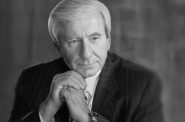 May 12th, 2017 by Gabrielle Barriere
May 12th, 2017 by Gabrielle Barriere
-
MaryNell Regan on the Hot Seat
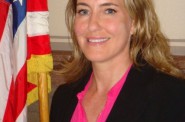 Oct 14th, 2015 by Laura Thompson
Oct 14th, 2015 by Laura Thompson


